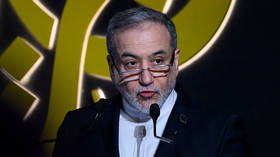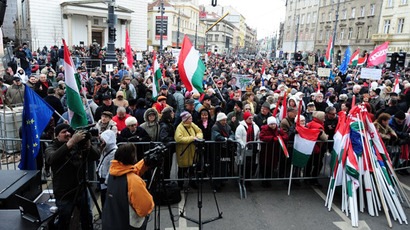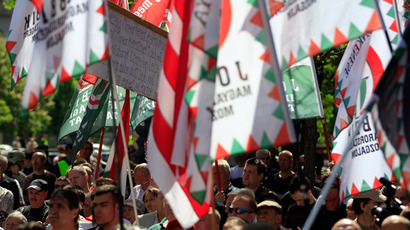Hungary re-elects ruling party in parliamentary vote, far-right gains support
Hungarians re-elected Viktor Orban, who led the country out of crisis and resisted Brussels’ influence, as prime minister, early parliamentary election results showed. Meanwhile, the far-right Jobbik party gained substantial political power.
Viktor Orban has declared victory to a jubilant crowd at the Fidesz party's election headquarters.
"This was not just any odd victory. We have scored such a comprehensive victory, the significance of which we cannot yet fully grasp tonight," he said. He added that the voters “confirmed that Hungary's place is in the EU but only if it has a strong national government."
Jobbik party leader Gabor Vona said the far-right group is now the strongest national radical party in the EU.
"Jobbik continuously ... increases its popularity...And ahead of the European Parliament elections it is important to make clear that today in the EU Jobbik is the strongest national radical party," Vona told a news conference.
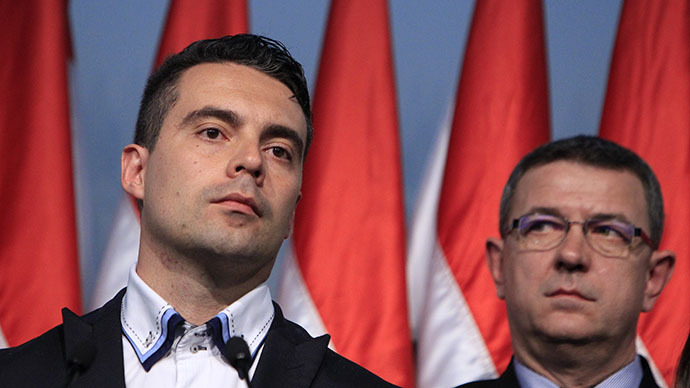
The Fidesz party is estimated to have won 133 out of 199 mandates in parliament, the election office said after 96 percent of the votes were counted. The leftist alliance is forecasted to win 38 seats, while Jobbik is expected to win 23 seats.
Earlier, the election office announced that Orban's Fidesz party received over 48 percent of the vote, based on a partial tally published by election officials after a quarter of the ballots were cast.
The Fidesz party is well ahead of the left-wing opposition alliance, which has 22 percent of the votes, and the far-right Jobbik party which has 20.7 percent, according to exit polls.
"We can now say for certain that for the first time since the change of regime, a centre-right government will govern for two successive terms," Fidesz lawmaker Gergely Gulyas said, as quoted by Reuters.
Orban is popular with voters mainly due to his stabilizing policies towards the country’s finances and cutting their electricity and gas bills by a fifth. Orban says his government’s goal is to transform Hungary into a "race car" from the "old banger" it had become after eight years of ruinous socialist rule.
Since scoring a landslide victory of two thirds in 2010, the first measures of Orban’s populist government included abolishing university tuition fees and reintroducing universal maternity benefits.
With Hungary having repaid an emergency IMF loan, Orban's economic policy was also aimed at cutting taxes and social insurance contributions over four years. In 2008, amid the global crisis Hungary was saved from bankruptcy with a $26 billion rescue package from the IMF and the EU. Two years later his government decided not to renew the deal to avoid closer IMF scrutiny of its economic policies. In 2013, Hungary announced plans to repay its bailout loan from the International Monetary Fund early and asked the organization to leave the country.
“A Fidesz-led government would guarantee long-term political stability and policy continuity,” Blanka Kolenikova, a senior analyst at think-tank IHS Country Risk, said in a research note.
Orban is also known for strong policies for the country’s integrity and repeated disagreements with the European Union and international investors, because of heavy taxes on the country’s mostly foreign-owned banks, telecoms and energy firms.
Critics, however, say the PM has used his mandate to curb democratic checks and balances and the freedom of the media – allegations his government rejects.
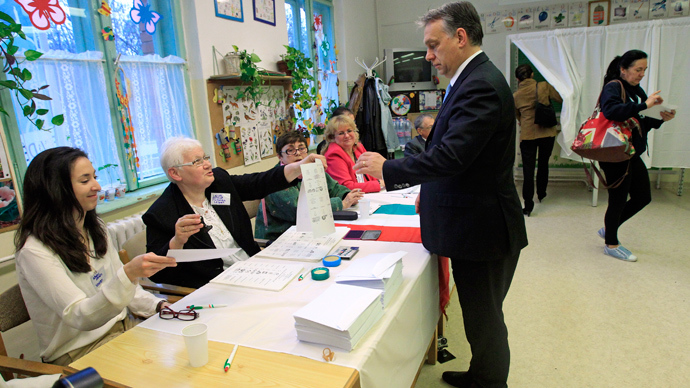
The Hungarian Socialist Party, second in the Median poll, has more ambitions in the elections. Its leader, Attila Mesterhazy, told the daily Nepszabadsag that he was certain his alliance for a “change in the government” would win the election. He even claimed he will be the next prime minister, adding that he wanted to build a country in which even those who do not support him would find peace.
Yet another candidate, the Jobbik party is now trying to shed its far-right image and appeal to a younger audience. The party, which states its main goal is protecting "Hungarian values and interests," has been accused of anti-Semitism, racism, and homophobia. Gabor Vona, the 35-year-old leader of the Movement for a Better Hungary, hopes to win over first-time voters unhappy with the two main parties.
New electoral law
Meanwhile, voting has been underway since 0400 GMT at 10,000 polling stations. The unofficial result will be announced on Sunday night. This time Hungarians will have a new system of voting. Under the new electoral law there are only 199 seats instead of the previous 386. The constituency seats have been also reduced to 106 from the previous 176.
There will be no more 2-round systems. The turnout percentage is no longer necessary. Earlier, 50 percent turnout was needed for the first round and 25 percent for the second.
For the first time, there will be a vote for ethnic Hungarians, who were locked outside Hungary’s redrawn borders after World War I, although they are not likely to have a major impact on the election’s outcome.
A total of 23 parties will apply to 18 provincial electoral lists, with 1,554 individual candidates.







